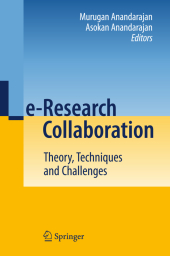 Neuerscheinungen 2014Stand: 2020-02-01 |
Schnellsuche
ISBN/Stichwort/Autor
|
Herderstraße 10
10625 Berlin
Tel.: 030 315 714 16
Fax 030 315 714 14
info@buchspektrum.de |

Murugan Anandarajan
e-Research Collaboration
Theory, Techniques and Challenges
Herausgegeben von Anandarajan, Murugan; Anandarajan, Murugan
2010. 2014. xvii, 326 S. 235 mm
Verlag/Jahr: SPRINGER, BERLIN; SPRINGER BERLIN HEIDELBERG 2014
ISBN: 3-642-43033-3 (3642430333)
Neue ISBN: 978-3-642-43033-6 (9783642430336)
Preis und Lieferzeit: Bitte klicken
Research 2.0 is now a critical component in research management. This book describes how Web 2.0 technologies can help researchers collaborate. It contains examples of web portals including MyNetResearch and discusses critical aspects of research management.
Research in both academic and non-academic circles has remained virtually identical in its conduct and organization over the last few decades. Disparate groups of researchers have worked on their ideas, projects and inventions in isolated clusters, with little sharing of information and synergies from collaboration. The advent of social networks and Web portals such as MyNetResearch have led to the creation of new research networks that dramatically reduces the barriers and obstacles to collaboration by researchers who are geographically, organizationally and disciplinarily distant.
The current tens of thousands and eventually millions of researchers who will use research networks are ushering in a new paradigm for research. In this paradigm collaboration is made much easier, sharing of research knowledge is instant, and synergies from routine collaboration will yield huge advances in research productivity and innovation. This book examines how research networks are changing the practice of research and decide how best to embrace such technologies and use them to their best advantage.
e-Research Collaboration: Theory.- An Overview of e-Research Collaboration.- An Anatomy of Collaboration Within the Online Environment.- Time, Place and Cyberspace: Foundations for Successful e-Research Collaboration.- Gaps and Bridges in Interdisciplinary Knowledge Integration.- Building a Conceptual Framework for Creating New Knowledge Through a Virtual Interdisciplinary Environment Process.- e-Research Collaboration: Technologies.- Serverless Social Software for Nomadic Collaboration.- A Taxonomy of e-Research Collaboration Tools: Using Web 2.0 to Connect, Collaborate and Create with Research Partners.- Blogging to Accelerate Peer Review of Doctoral Dissertations.- The Butterfly Effect: An Approach to Web-Based Scientific Data Distribution and Management with Linkages to Climate Data and the Semantic Web.- Collaboration Among e-Research Projects in the UK: An Analysis Using Online Research Methods.- e-Research in International Cooperation Networks in Science and Technology Research.- Wikis in Design Engineering Research.- Shifting the Research Grant Collaboration Paradigm with Research 2.0.- Doctoral Programs in the Age of Research 2.0.- e-Research Collaboration: Challenges.- Issues Related to Research Ethics in e-Research Collaboration.- The Coming "République des Lettres".- E-Research Collaboration and the Free-Rider Problem: Communication Solutions to Social Dilemmas in Computer Mediated Research Collaborations.- Knowledge Sharing by Web 2.0 in Real Estate and Construction Discipline.- Creation of Social Capital in a Web Based Virtual Research Environment.


